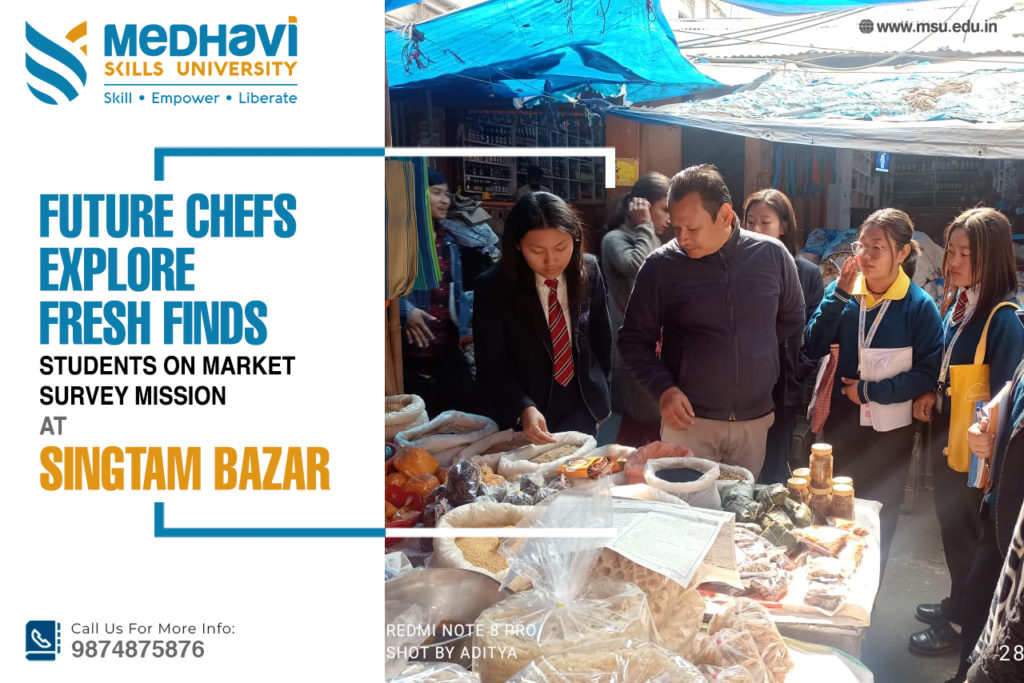Program Overview
The B.Sc. in Hospitality and Hotel Management program equips students with practical skills and industry knowledge to excel in the dynamic hospitality sector
The B.Sc. in Hospitality and Hotel Management in Sikkim at the School of Hospitality and Tourism at Medhavi Skills University is not just about textbooks. This hotel management course is a meticulously designed program that bridges the gap between theory and practice, driving you towards a successful career in this booming industry. The global hospitality and tourism industry is experiencing unprecedented growth, projected to reach trillions of dollars in the coming years. This hospitality administration course, which is our specialization program at School of Hospitality and Tourism, is designed to equip you with the knowledge and skills to thrive in this dynamic sector.


MSU Advantages
Flexible learning design of this hotel management course also allows personalized education. This MSU an ideal choice for future-ready hotel management professionals. Explore some of the advantages of studying hospitality administration course at MSU:
Program aligned to NEP 2020
Focus on Outcome Based Education
Industry-Aligned Curriculum
In-House Food & Beverage Service Lab, Food Production Lab, and Front Office & Housekeeping Labs
70% Curriculum includes Skill Component
Hands-On Learning
Learn from seasoned hospitality professionals
Immersive Industry Exposure through industry visits, guest lectures, and networking opportunities
Opportunity to ‘Learn and Earn’ from one of our affiliated national and international hotel organizations and earn a great stipend
Visit star hotels in and around Sikkim to experience how the industry works
Engage with industry experts providing invaluable insights and real-world perspectives

Do-Experience-Learn
Discover the advantage of MSU's cutting-edge infrastructure, featuring modern laboratories, classrooms, and industry-relevant facilities

.webp)


.webp)

Eligibility Criteria
Candidates who have completed Higher Secondary School Certificate (HSC) or equivalent from State Boards, CBSE, or ICSE. Also, a minimum of 50% marks in the 12th standard is required, with English as one of the subjects.
Academic Framework
A curriculum designed to build core hospitality skills, paired with a clear pathway to diverse global careers
Learning with Industry
Comprehensive curriculum blending hospitality skills, management expertise, and industry-focused practical learning






Steps to Follow for Application





Program Specific Outcomes
A Graduate of B.Sc. in Hospitality and Hotel Management should be able to:
PSO 1
Demonstrate the acquisition of comprehensive knowledge and understanding of the Hospitality Industry in a multidisciplinary context, linkages with related fields, and emerging developments associated with the industry.
PSO 2
Demonstrate the acquisition of practical, professional, and procedural knowledge required for professional or highly skilled work related to Hotel Industry including knowledge required for undertaking self-employment.
PSO 3
Demonstrate acquisition of skills in areas related to Hospitality specialization including wide-range of practical skills, involving variable routine and non-routine contexts relating to the chosen field(s) of learning.
PSO 4
Demonstrate the acquisition of the capacity to extrapolate from what has been learned, translate concepts to real-life situations and apply acquired competencies in new / unfamiliar contexts.
Our Industry Partners
Leading industry partners to provide real world hands-on exposure






Discover the real-world impact of MSU from our students
At Medhavi Skills University, I gained practical knowledge that prepared me for an enriching training experience at Hyatt Regency Kolkata. The challenges shaped my passion for baking, inspiring me to start my own bakery business with confidence and skill.
Medhavi Skills University provided me with practical training and unwavering support, enabling me to intern at High Residency Kolkata. Facing challenges, I gained skills in time management, teamwork, and guest handling, an unforgettable step toward my hospitality career dreams!
Hi, I’m Pooja Limbu, a 5th-semester BSc Hospitality student at Medhavi Skills University. With hands-on training and expert guidance, I’ve gained invaluable skills. My on-job training at ITC Royal Bengal, Kolkata, sharpened my expertise and prepared me for global opportunities in hospitality.
Find Quick Answers to Your Concerns











